What is Senate Bill 299 and why do we need it to strengthen California’s democracy?
Right now there are 4.7 million Californians who are eligible but unregistered to vote. This is the largest population of eligible unregistered voters in the country. If these folks were their own state, it’d be the 25th largest in the U.S. This group is disproportionately made up of Asian American, Black, and Latinx citizens*, leading to an electorate that skews whiter than the state as a whole and diminishes the power of historically marginalized communities. This is a result of California’s racist legacy of voter registration.
Senate Bill 299 (previously SB 846) would give the Secretary of State authority to upgrade the current partial automatic voter registration system to a more streamlined, efficient, secure, and accessible Secure AVR (SAVR) model. SAVR would bring nearly all eligible Californians onto the rolls, dismantling one of the barriers that communities of color in our state face to participating in our democracy.
Voter registration was designed in the 1800s as a barrier to participation in order to keep Black, immigrant, low-income, and minority communities from accessing the ballot. By improving California’s voter registration system, we ensure that voting is not a privilege but a right. As voting rights are being attacked across the country, we need to enfranchise all eligible voters in California.
*The Census does not collect sufficient data regarding voter registration rates of Pacific Islanders and Indigenous Americans, which is another barrier to full civic participation.
So, how does it work?
Right now, when individuals go to the DMV, they are asked whether they are eligible to register to vote.
SB 299 gives the Secretary of State authority to upgrade California’s current AVR system to a Secure AVR system. If the Secretary determines that adequate technology and infrastructure are in place, the Secretary can ensure that when an eligible DMV customer declines to register to vote, they are still automatically added to a pre-approved voter list.
Eligibility is verified through documents presented as part of existing DMV procedure, such as a U.S. passport or birth certificate. The Secretary of State would have the power to adopt regulations for how people on the pre-approved list can activate their registration, and could adopt streamlined procedures such as allowing pre-approved voters to activate their registration by appearing at the polls, without the need for a conditional registration. With the pre-approved list, registration would be removed as a barrier for millions of eligible people; all they would need to do is choose whether or not they want to vote.
This system can bring millions more people onto the rolls. When a parallel system was adopted in Colorado, they doubled the number of people added to the rolls at the DMV, with an even larger impact for 16- to 17-year-olds eligible for pre-registration. Additionally, because California’s eligible but unregistered population is disproportionately made up of people of color, helping these folks join the voter rolls means the voting population will start to look more like the whole population of California.

SB 299's Impact
-
Providing Protections for Non-Citizens
This kind of truly automatic verification and voter registration system also provides key protections to non-citizens who interact with state agencies. Secure AVR affirmatively filters customers out of the existing voter registration opportunity if they have provided the DMV with a green card or other document clearly establishing non-citizenship as part of their transaction. This protects non-citizens from potentially severe immigration consequences that could result from innocent mistakes.
-
A More Efficient and Customer-Friendly System
Secure AVR improves the existing motor voter process by automatically checking a DMV customer’s registration status during their transaction, and then tailoring the motor voter questions depending on the person’s registration status. Data from other states shows that a more tailored experience results in more people registering to vote and updating their registration, improving the overall accuracy of the voter file. Senate Bill 299 would not only help register new eligible voters, but automatically update information for existing voters, as well. This means voter information stays up to date, election mail is more likely to reach its proper destination, and other changes are streamlined across agencies, easing the process for, for example, LGBTQIA+ individuals seeking name changes.
-
Restoring the Right to Vote
Senate Bill 299 would also go a long way to help formerly incarcerated citizens reclaim their constitutionally guaranteed freedom to vote. Many formerly incarcerated individuals often decline registration because they’re unsure if they’re eligible. Secure AVR programs, like the one SB 299 provides for, verify eligibility automatically, so registrants don’t have to worry about making a mistake on their end.

